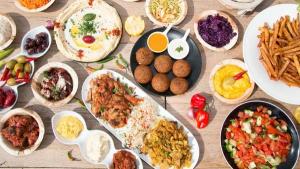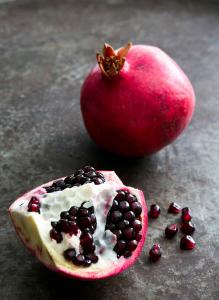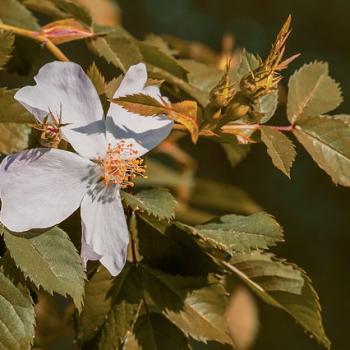
“You are cutting this apple with such presence,” a dear friend once observed as I was preparing breakfast in our kitchen. “You can see this?” I asked. “Yes, it’s obvious to me,” he replied. I smiled and felt gratitude in my heart for this witnessing of my journey with food.
Many years ago, I was blessed to have been taught by my teachers to regard all food as living entities that are in service to our nourishment and well-being. I learned to see this vital aspect of Life not as a food chain with the lowest forms of life getting eaten by the next higher level of life but as a sacrificial cycle where all matter is alive and in service to the realization of an ever-higher state of consciousness. For Muslims, it may be easier to see animals as a sacrifice for our nourishment and well-being, but plants are part of this cycle too. This notion of sacrifice underlies what we consider to be Halal food; the animal is ritually consecrated to God by invoking His name at the time of slaughter. What was taught to me is to see fruits, vegetables, grains and all other foods as also sacrificed, and that this sacrifice is offered consciously in the service of Life. It is how we are all contained within the embrace of Love. Mawlana Rumi alludes to this when he wonders at how the bread that we consume becomes an integral part of us.
If there had not been love, how would there have been existence?
How would bread have attached itself to you and become assimilated?
The bread became you through your love and appetite;
for how else should bread have had any access to your living spirit?
Love makes lifeless bread into spirit:
It can make the spirit that was perishable everlasting.
[Mathnawi: V, 2012-2014]
In the Mevlevi Sufi tradition we are taught that everything in existence is, in varying degrees, conscious and in service to the divine. We are taught to honor and respect and be thankful to all things in life that are in service to us. So, for example, we are taught to show love and gratitude for our beds that hold us in comfort, for our pillows that hold our heads, for our clothes that protect us, for our cups that hold our water, for the earth that holds us up, for everything that we are in “relationship” with in our lives. This teaching embodies the Quranic principle that,
“The seven heavens and earth and everything within them glorify Him. There is nothing in existence that does not glorify Him in praise but you do not comprehend their glorification. Truly, He is Gentle, Forgiving.” Q17:44

In the Mevlevi tradition, the kitchen is a sacred space. It is entered consciously and the work of preparing food is done with presence in a state of silent prayer and remembrance. Every aspect of the preparation of the food is a conscious act of loving generosity and gratitude for the sustenance bestowed by our Creator. We say that food is “breath”, meaning that the soul of the one who prepares the food is contained within it. The more loving, the more generous, the more selfless one can be, the tastier the food, and the more nourishing and healing.
Since these keen lessons, I have been engaged in a practice of being in presence whenever I prepare food in our kitchen at home. Every morning when I prepare a plate of fruits for breakfast, I greet each fruit with peace and express gratitude for its sacrifice. When I cut it, I say Bismillah with each stroke of the knife. And when I eat the fruit, I imagine that it is becoming part of me. I’ve been upholding this practice for years now and it has become an intrinsic part of my consciousness. This practice has brought deeper understanding of what it means to eat food that is Halal.
It wasn’t always this way. I think back on how heedless I was when preparing and eating food. My relationship with pomegranates is a good example. At the beginning, I learned a utilitarian way of seeding the fruit from my sister-in-law, “The easiest way is to cut the pomegranate in half and then take a hammer and strike the tops and all of the seeds will fall out,” she instructed. And this is what I did until I knew better. When I think about those times my heart shudders at the harshness, cruelty and lack of love in how I used to bludgeon the fruit, smashing its seeds out of its rind.
Now, I approach the peeling of a pomegranate as a sacred act of worship and I “see” the fruit differently.

I begin with Bismillah holding the fruit respectfully and expressing gratitude for its sacrifice. When I peel the pomegranate, I find myself taken by its fascinating beauty. On the outside the skin of the fruit feels leathery and has multi-hued reds and browns that at once feels like the sun-hewn skin of an old person as well as the subtle shades of colors and light in a Rembrandt painting. Its calyx looks like a crown, and in some traditions, it is said that the calyx of the pomegranate is what originally inspired the design of royal crowns.
I wield the knife and again say Bismillah and as I begin to cut, I invoke Ya Rahman, Ya Raheem over the fruit. Somehow, I feel what the pomegranate feels. Sometimes, tears flow from my eyes as I understand the solemnness and sacredness of preparing food.
When I cut its tough outer skin and, with Bismillah, gently split the fruit open in half, I am taken by the beautiful ruby red clusters of seeds. I feel exhilarated when I see those seeds! They give me such a joy, a feeling of abundance, generosity, and goodness. For me, this fruit symbolizes the process of creation;
“Do those who deny not see that the heavens and earth were one and We split them open…” Q21:30
The single fruit contains within it a multiplicity of seeds that come forth once it is split open.
In the past I used to splatter the juice from the seeds all over the counter and cabinets. Now, I take special care to not shed any of its blood. If a seed is holding on a little tighter, I gently ease it out with just a little more pressure. I’ve become adept now at easing the seeds out of the inner core with special care.
As we enter the last 10 days of Ramadan, may we approach our food with conscious presence, gratitude and tenderness. May we become more and more aware of the sacredness of food and of the conscious sacrifice that is made for the sake of Life of which we partake. And may what we take into our bodies be truly Halal for us.












